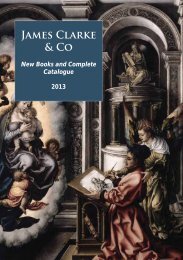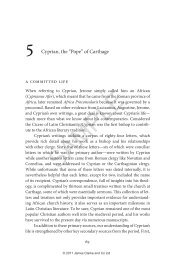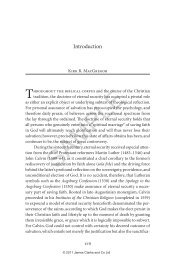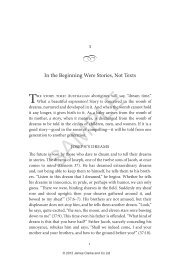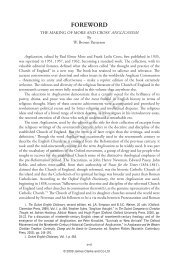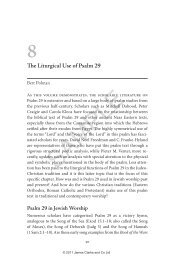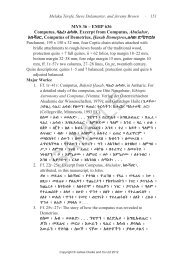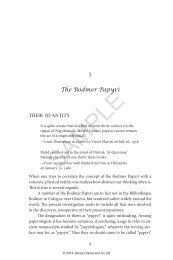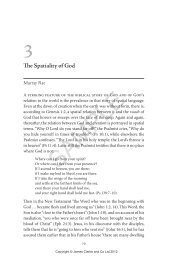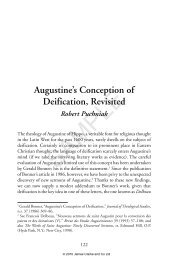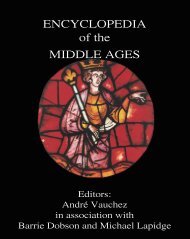Extract from Chapter 1 - James Clarke and Co Ltd
Extract from Chapter 1 - James Clarke and Co Ltd
Extract from Chapter 1 - James Clarke and Co Ltd
Create successful ePaper yourself
Turn your PDF publications into a flip-book with our unique Google optimized e-Paper software.
1<br />
The Textual Worlds of the Analects<br />
<strong>and</strong> the Letter to the Galatians<br />
INTERTEXTUAL READING OF CLASSICS<br />
Laozi once said to <strong>Co</strong>nfucius: “Those of whom you speak have all already<br />
rotted away, both the men <strong>and</strong> their bones. Only their words are<br />
here.” 1 So it is that those who seek to glean wisdom <strong>from</strong> historical figures<br />
encounter the challenge that “only their words are here.” Yet, behind<br />
the words is a life, <strong>and</strong> our effort here is to read the texts of <strong>Co</strong>nfucius<br />
<strong>and</strong> Paul in order to reconstruct something of their lives. Inevitably, we<br />
read ourselves into their texts, since interpreters read <strong>from</strong> their social<br />
locations, bringing with them presuppositions that are both limiting <strong>and</strong><br />
creative. A faithful reading is not simply a historical recovery of what<br />
the text meant, but a creative engagement with the text that continues to<br />
speak to the later generation of readers.<br />
SAMPLE<br />
Intersubjective Reading, Exegesis, <strong>and</strong> Eisegesis<br />
Ward Gasque is a historical critic who desires an objective interpretation<br />
of Paul, <strong>and</strong> his lament at perspectival <strong>and</strong> subjective reading is quite true<br />
1. This translation is found in Nienhauser, ed., The Gr<strong>and</strong> Scribe’s Records, Vol. VII:<br />
The Memoirs of Pre-Han China by Ssu-ma Ch’ien, 7:21–22; see Shiji 63:1.<br />
53<br />
© 2008 <strong>James</strong> <strong>Clarke</strong> <strong>and</strong> <strong>Co</strong> <strong>Ltd</strong>
54 MUSING WITH CONFUCIUS AND PAUL<br />
<strong>and</strong> apt when he writes, “So often the Paul who emerges <strong>from</strong> a scholar’s<br />
study is a Paul created in the scholar’s own image, one limited by the<br />
scholar’s own theological or ideological perspective, the issues of his own<br />
day.” 2 I am honored when I can read Galatians <strong>and</strong> Analects as a Chinese<br />
Christian, creating a <strong>Co</strong>nfucius <strong>and</strong> a Paul in my image. Gasque’s perspective<br />
is lopsided, since every reading process is intersubjective, <strong>and</strong> is<br />
therefore a constant shifting of images between the writer <strong>and</strong> the reader.<br />
It cannot be otherwise. I want to qualify what Gasque has said: Even the<br />
purportedly “objective” reading based on historical-critical methods is<br />
not without its own assumptions, for the presuppositions of exegetes are<br />
conditioned by their language <strong>and</strong> culture. Exegesis based on grammatical<br />
analysis is often deemed to render the most objective reading of the<br />
biblical text. Biblical scholars assume that the Greek grammar <strong>and</strong> syntax<br />
can reveal the objective meaning of the text. However, interpreters of the<br />
Bible using the same grammatical reading may offer diverse meanings of<br />
the same text. For we underst<strong>and</strong> grammar <strong>and</strong> history not according to<br />
objective <strong>and</strong> abstract principles, but in relation to our subjective, partial,<br />
<strong>and</strong> changing assumptions about language <strong>and</strong> history. Thus even grammatical<br />
reading is not without subjective input. Words become archaic,<br />
their referents unknown. Some texts contain words found nowhere else,<br />
<strong>and</strong> require an educated guess as to their meaning. In times past, much<br />
has been made of the precise explication of a text (exegesis), with warnings<br />
against reading into the text what is not there (eisegesis).<br />
The classic distinction between “exegesis” (reading objective, historical<br />
meaning out <strong>from</strong> the text) <strong>and</strong> “eisegesis” (reading subjective meaning<br />
into the text) may not be helpful once we move to a cross-cultural<br />
interpretation that seeks to honor perspectival readings. At best the “exegesis/eisegesis”<br />
concern might be a construct that assumes a scholar can<br />
transcend his culture <strong>and</strong> detach himself <strong>from</strong> his own time <strong>and</strong> place,<br />
yet be able to become immersed in the past <strong>and</strong> know it with certainty.<br />
At worst, the “exegesis/eisgesis” differentiation is a scholarly fear of living<br />
in partial knowledge, the insecurity of shared ownership of any text, or<br />
the alienation of self <strong>from</strong> the network of texts with which we all work. I<br />
am here assuming that a purely objective reading of <strong>Co</strong>nfucius <strong>and</strong> Paul<br />
that transcends culture is unrealizable. The language of <strong>Co</strong>nfucius (fifth<br />
century BCE Chinese) <strong>and</strong> Paul (first century CE Greek) is not always<br />
SAMPLE<br />
2. Gasque, “Images of Paul,” 8.<br />
© 2008 <strong>James</strong> <strong>Clarke</strong> <strong>and</strong> <strong>Co</strong> <strong>Ltd</strong>
The Textual Words of the Analects <strong>and</strong> the Letter to the Galatians<br />
55<br />
clear, <strong>and</strong> our knowledge of their worlds is limited. But these assumptions<br />
do not lead us to despair; we need to be all the more diligent in<br />
seeking underst<strong>and</strong>ing. They are, after all, “classics.”<br />
The Meanings of “Classics”<br />
The letter of Paul to the Galatians is indisputably one of the most influential<br />
canonical texts of the Christian tradition. The Analects is also well<br />
regarded as one of the classics. The Chinese word “classics” (jing) carries<br />
the connotation of “weaving”—implying the intertextual responsibility<br />
of text, author, <strong>and</strong> reader in the discovery, transmission, <strong>and</strong> practice of<br />
wisdom, whether by way of an oral/auditory or written medium. The ancient<br />
Chinese language, the language of the Analects, is not so much comprised<br />
of descriptive statements of what the world is, but performative<br />
<strong>and</strong> prescriptive utterances for guiding people into action <strong>and</strong> moving<br />
them toward the world as it should be. 3 The classics are texts containing<br />
communal wisdom, have stood the test of time, <strong>and</strong> continue to empower<br />
the community to live in wholeness. In our modern (Western) world,<br />
“the classics” refer to enduring normative texts that have a revelatory,<br />
transcendental, <strong>and</strong> objective nature. The classics contain the eternal<br />
principles of the cosmic order; they are works whose ideals <strong>and</strong> precepts<br />
transcended the historical circumstances of their origins <strong>and</strong> formed<br />
the basis of the social, political, economic, <strong>and</strong> religious institutions that<br />
followed.<br />
The classics in the modern Western sense are concerned with truth,<br />
ancient Chinese classics with practical wisdom, a wisdom that is generative<br />
of life abundant. There is no lexical equivalent for truth in classical<br />
Chinese. In the West (especially in modernity), truth is equated with<br />
“objective reality.” Modern epistemology tells us that we discover “objectivity”<br />
through the discovery of “the Eternal One,” that “it is by virtue of<br />
analogy with this ‘objective One’ that we are able to disengage <strong>from</strong> our<br />
contexts, thereby resolving them into ‘objects’ independent of ourselves.” 4<br />
The suggestion here is not a dichotomous underst<strong>and</strong>ing between classical<br />
Chinese <strong>and</strong> modern Western languages—as though one were pre-<br />
SAMPLE<br />
3. See Hansen, Daoist Theory of Chinese Thought, 33–52, on dao as linguistic communication<br />
for leading people on the way (dao).<br />
4. Ames <strong>and</strong> Rosemont, Analects, 31.<br />
© 2008 <strong>James</strong> <strong>Clarke</strong> <strong>and</strong> <strong>Co</strong> <strong>Ltd</strong>
56 MUSING WITH CONFUCIUS AND PAUL<br />
scriptive, the other descriptive, <strong>and</strong> one about event, the other substance.<br />
I am suggesting that for me as a modern Chinese, trained in the Western<br />
mode of discourse, the Analects may not be discounted simply because<br />
it does not proclaim truth in the same way Paul believes he is doing in<br />
Galatians. By bringing the Analects into an intertextual relationship with<br />
Galatians, I am not trying to resolve the issue of which is more authoritative.<br />
Intertextuality answers that question by acknowledging the mutually<br />
reinforcing authority of both texts. The Analects <strong>and</strong> Galatians are received<br />
texts that continue to speak to their respective global communities by<br />
virtue of their founding, canonical, <strong>and</strong> commentarial functions.<br />
Because the languages of the Analects <strong>and</strong> Galatians (classical<br />
Chinese <strong>and</strong> Koine Greek respectively) are alien to our modern Western<br />
experience, I have deemed it even more necessary for us to examine with<br />
care individual words, concepts, <strong>and</strong> phrases. This close interpretive process<br />
will prove helpful to us as we cross over <strong>from</strong> our cultures to that of<br />
antiquity. Furthermore, such a procedure will help us avoid letting our<br />
own cultural assumptions flatten out the otherness of the foreign culture.<br />
Most importantly, looking at the texts this way will help us personalize,<br />
perhaps even internalize, the wisdom of the classics, thus rejuvenating<br />
new life into the texts.<br />
I will summarize the basic rhetorical argument of the Analects <strong>and</strong><br />
Galatians below with the purpose of constructing the theological ethics<br />
of the two texts.<br />
SAMPLE<br />
THE ANALECTS: TEXT, LANGUAGE, AND CONTENT<br />
The Classic Text <strong>and</strong> Its <strong>Co</strong>mposition<br />
The Analects (Lunyu in Chinese), a term coined by a Scottish<br />
<strong>Co</strong>ngregationalist missionary to China called <strong>James</strong> Legge (1815–1897),<br />
means “categorized conversation” or “collection of sayings.” 5 The Analects is<br />
one of four <strong>Co</strong>nfucian classics, which, together with the Five Classics, were<br />
integrated into a <strong>Co</strong>nfucian canon in the Former Han era (201 BCE—25<br />
CE). The Four Books were the core texts of <strong>Co</strong>nfucianism—the Analects<br />
(Lunyu), Mencius (Mengzi), the Doctrine of the Mean (Zhongyong), <strong>and</strong><br />
5. See an excellent discussion on the Chinese title of the work <strong>and</strong> its textual history:<br />
Cheng, Lunyu Jishi; Yang, Lunyu Yizhu, 3–8; <strong>and</strong> Slingerl<strong>and</strong> trans., <strong>Co</strong>nfucius Analects,<br />
xiii–xxv.<br />
© 2008 <strong>James</strong> <strong>Clarke</strong> <strong>and</strong> <strong>Co</strong> <strong>Ltd</strong>
The Textual Words of the Analects <strong>and</strong> the Letter to the Galatians<br />
57<br />
the Great Learning (Daxue). 6 They became unified texts only in the Sung<br />
dynasty (960–1279 CE). They are considered classical (jing) texts (wen)<br />
because they have long been regarded as containing a comprehensive underst<strong>and</strong>ing<br />
of the moral, philosophical, <strong>and</strong> political worlds of human<br />
endeavor. The Analects has special place because it collects the teachings<br />
of China’s greatest master, <strong>Co</strong>nfucius. Later commentators have found in<br />
the Analects the essence of the Sage’s teaching <strong>and</strong> the master key to the<br />
classics as a whole. 7<br />
The composition of the Analects began soon after <strong>Co</strong>nfucius’ death<br />
(in 479 BCE) by his disciples <strong>and</strong> successors for the next two centuries<br />
(probably before 220 BCE). By the time of the Han dynasty (206<br />
BCE–200 CE), there were three versions of the Analects (according to<br />
Hanshu, History of the Han Dynasty), <strong>and</strong> the received text (the Lunyu,<br />
which we have today) is made up of these three versions, edited first by<br />
He Yan (190–249 CE). The Analects is a record of the Master’s teaching<br />
as preserved by his earliest disciples with material added by different<br />
<strong>Co</strong>nfucian sects, sometimes of the same mind, sometimes of a competing<br />
spirit. Each composer or editor had his own intention in the editing<br />
process. 8 The present form of the Analects (containing 15,935 words altogether)<br />
is comprised of twenty books (or sections, sometimes referred<br />
to as chapters). Each book is divided into divisions (or paragraphs, <strong>and</strong><br />
sometimes referred to as chapters, about five hundred in all) of individual<br />
6. See Legge <strong>and</strong> Yang, trans., The Four Books.<br />
7. According to the prominent Qing historian of the classics, Chen Li (1810–1882),<br />
“the essentials of classical studies are all in the Analects” (Henderson, Scripture, Canon,<br />
<strong>and</strong> <strong>Co</strong>mmentary, 18). Liu Fenglu remarked that “the Analects sums up the great meanings<br />
of the Six Classics (Henderson, Scripture, Canon, <strong>and</strong> <strong>Co</strong>mmentary, 19). The Analects<br />
was considered a classic by Jesuit missionaries in China <strong>and</strong> Japan during the sixteenth<br />
through eighteenth centuries. Protestant missionaries in the nineteenth century were<br />
also attracted to it; <strong>James</strong> Legge translated the classics into English. Among the best<br />
English translations of the Analects are those by <strong>James</strong> Legge, Arthur Waley, D. C. Lau,<br />
Roger T. Ames <strong>and</strong> Henry Rosemont Jr., Chichung Huang, <strong>and</strong> Edward Slingerl<strong>and</strong>. The<br />
four Chinese commentaries on the Analects I use are: He <strong>and</strong> Xing, Lunyu Zhushu; Yang,<br />
Lunyu Yizhu; Qian, Lunyu Xinjie; Chen, Lunyu Duxun Jiegu; <strong>and</strong> Zhu ed., Sishu.<br />
An excellent online resource on <strong>Co</strong>nfucianism is: http://www.confucius2000.com/.<br />
8. On the technical study of the redaction of the Analects, see Norden ed., <strong>Co</strong>nfucius<br />
<strong>and</strong> the Analects, 14–18; Waley, The Analects of <strong>Co</strong>nfucius, 21–26. Following Waley,<br />
Norden sees Books 3–9 as the earliest portion, with explicit topics, yet Book 10 is irrelevant<br />
<strong>and</strong> Book 1–2 without explicit topics. Brooks <strong>and</strong> Brooks, The Original Analects,<br />
propose the accretion theory. They see only Book 4 is the original <strong>and</strong> dated 479 BCE,<br />
right after the death of <strong>Co</strong>nfucius, <strong>and</strong> the last book (20) was dated 249 BCE.<br />
SAMPLE<br />
© 2008 <strong>James</strong> <strong>Clarke</strong> <strong>and</strong> <strong>Co</strong> <strong>Ltd</strong>
58 MUSING WITH CONFUCIUS AND PAUL<br />
dialogues or sayings. Most of the sayings are concerned with political<br />
ethics <strong>and</strong> with the cultivation of virtue. 9<br />
9. The result of the redaction process is the work we have today that has titles to every<br />
book (or section). Below are the titles of the books <strong>and</strong> their component sections with a<br />
brief summary of their content in parenthesis:<br />
Book 1–2: The sayings of <strong>Co</strong>nfucius <strong>and</strong> his disciples<br />
Book 1: Xue Er—On Learning (On studying, life, language, truth, etc.)<br />
Book 2: Weizheng—On Governing (On government, poetry, <strong>Co</strong>nfucius’ own life<br />
of study, junzi [exemplary person], etc.)<br />
Book 3–9: <strong>Co</strong>re Books (Probably the earliest material with topical discussions)<br />
Book 3: Bayi—Eight Rows of Dancers (On ritual <strong>and</strong> music)<br />
Book 4: Liren—To Live Benevolently/Humanely (Aphorism on ren)<br />
Book 5: Gongye Chang—Gongye Chang (A major disciple of <strong>Co</strong>nfucius,<br />
contains sayings on judgment about others)<br />
Book 6: Yong Ye—Yong Ye (a major disciple of <strong>Co</strong>nfucius, also known as Ran<br />
Yong or Ran Bo-niu, a discussion on judgment <strong>and</strong> official<br />
responsibility)<br />
Book 7: Shu Er—To Transmit (Biographical material on <strong>Co</strong>nfucius)<br />
Book 8: Tai Bo—Tai Bo (The eldest son of the Zhou dynasty’s first king; contains<br />
Master Zeng’s analects [chap. 3–7] <strong>and</strong> a discussion on the sage kings<br />
[chap. 18–21])<br />
Book 9: Zihan—Master Seldom (The title is based on the first two words of the<br />
book, “The Master seldom . . . ” The book contains biographical material<br />
of <strong>Co</strong>nfucius.)<br />
Book 10–11: Topical Discourses<br />
Book 10: Xiang Dang—Native Place (On <strong>Co</strong>nfucius’s behavior in his native region<br />
<strong>and</strong> maxims concerning ritual.)<br />
Book 11: Xian Jin—Those Who First Entered (On rituals, music, <strong>and</strong> government)<br />
Book 12–20: Dialogues between the Disciples <strong>and</strong> the Master<br />
Book 12: Yan Yuan—The disciples ask about ren (humaneness), junzi (the<br />
exemplary person), clear-sightedness (min), government (zheng), etc.<br />
Book 13: Zilu—The disciples ask about government, ren [benevolence], junzi<br />
[exemplary person], etc.<br />
Book 14: Xian Wen—Xian, a disciple of <strong>Co</strong>nfucius, also known as Yuan Si. He<br />
asks about shame, <strong>and</strong> other disciples ask about being human,<br />
government, junzi [the exemplary person], etc.<br />
Book 15: Wei Ling Gong—Duke Ling of the state of Wei, who asks about<br />
<strong>Co</strong>nfucius. <strong>Co</strong>nfucius’ responses on virtue, junzi [exemplary person], his<br />
own teaching, dao [the way], etc.<br />
Book 16: Ji Shi—Ji Kangzi, one of the ruling families in the state of Lu, asks about<br />
warfare, <strong>and</strong> <strong>Co</strong>nfucius’ discourses on dao [the way], friendship, junzi<br />
[the excellent person], etc.<br />
Book 17: Yang Huo—Yang Huo, a government official who asks to see <strong>Co</strong>nfucius,<br />
but <strong>Co</strong>nfucius refuses. <strong>Co</strong>nfucius’ discourse on human nature, ren<br />
[humaneness], ritual, etc.<br />
SAMPLE<br />
© 2008 <strong>James</strong> <strong>Clarke</strong> <strong>and</strong> <strong>Co</strong> <strong>Ltd</strong>
The Textual Words of the Analects <strong>and</strong> the Letter to the Galatians<br />
59<br />
To translate the title Analects as “The Sayings of <strong>Co</strong>nfucius” is incorrect.<br />
There is not one author, there are multiple voices with the Master’s<br />
as the dominant one. Eight of the sixteen chapters in Book 1 are not<br />
even the teachings of <strong>Co</strong>nfucius; Book 2 begins with the voice of Master<br />
You; Books 12–20 contain sayings of the disciples; <strong>and</strong> Books 14 <strong>and</strong> 18<br />
even contain anti-<strong>Co</strong>nfucian stories. Of all the four canonical texts—the<br />
Analects, Mencius, the Doctrine of the Mean, <strong>and</strong> the Great Learning—the<br />
Analects is the one that contains sayings closest to the spirit of the Master’s<br />
teachings.<br />
Language of the Analects: Wenyan<br />
The Analects was written in the classical Chinese language called wenyanwen,<br />
the imperial language of ancient China in which most classics<br />
of history, philosophy, <strong>and</strong> literature were written. Classical Chinese is<br />
different <strong>from</strong> baihuawen (“the plain language” or modern Chinese), the<br />
vernacular written language widely used throughout the Chinese speaking<br />
world today. 10 Wenyan (classical Chinese) texts, such as the Analects,<br />
are more poetic, ambiguous, <strong>and</strong> polyvalent than baihua (modern<br />
Chinese) texts. 11<br />
Book 18: Weizi—Accounts of the viscount of Wei who left the tyrant ruler, Duke<br />
Jing of Qi, etc. This book contains few of <strong>Co</strong>nfucius’ sayings.<br />
Book 19: Zizhang—Sayings of Zizhang, Zixia, Ziyou, Master Zeng, Zigong. This<br />
book does not contain sayings of <strong>Co</strong>nfucius.<br />
Book 20: Yao Yue—Yao Said (On government <strong>and</strong> the m<strong>and</strong>ate of heaven.)<br />
10. The 1919 May Fourth Movement brought about the baihuawen, the vernacular<br />
written language widely used throughout the Chinese speaking world. It is more or<br />
less a transcription of how one speaks. The wenyanwen <strong>and</strong> baihuawen have different<br />
styles, grammars, <strong>and</strong> vocabularies. Generally speaking, wenyanwen is more gr<strong>and</strong> <strong>and</strong><br />
formal; it has stricter rules or patterns of expression, especially in poetic compositions.<br />
Baihuawen literally means “plain-saying.” It has a simpler style, looser sentence structure,<br />
<strong>and</strong> therefore needs more words to express the same idea than wenyanwen. Because of<br />
the history, wisdom, <strong>and</strong> beauty of wenyanwen, most writers today use baihua but then<br />
draw on the rich tradition of wenyan in the form of “short sayings,” called chengyu (proverbial<br />
sayings or anecdotes).<br />
11. Ames <strong>and</strong> Rosement have published substantial studies on the philosophical <strong>and</strong><br />
linguistic background of wenyan (classical Chinese). They argue that wenyan is probably<br />
not the exact language the people of antiquity spoke because of the high number<br />
of homonyms in the language, “with anywhere <strong>from</strong> two to seven different characters<br />
pronounced identically. Today the situation is worse. In a common five-thous<strong>and</strong>-word<br />
dictionary, for example, even when the tones are taken into account, forty semantically<br />
SAMPLE<br />
© 2008 <strong>James</strong> <strong>Clarke</strong> <strong>and</strong> <strong>Co</strong> <strong>Ltd</strong>
60 MUSING WITH CONFUCIUS AND PAUL<br />
It is important to note also that the Chinese language, whether<br />
wenyan or baihua, does not have moods, voices, tenses, articles, declensions,<br />
prepositions, or distinguishing features regarding parts of speech.<br />
Sometimes a word in a sentence can function as a noun, a verb, or another<br />
part of speech. This dynamic aspect of the Chinese language adds<br />
another layer of challenge to the modern mind that expects precision.<br />
These elliptical features of classical Chinese pose difficulty for interpreters<br />
of the Analects. F. S. C. Northrop underst<strong>and</strong>s this dynamic aspect of<br />
the Chinese language as the “intuitive, aesthetic, undifferentiated experience”<br />
of ancient Chinese epistemology:<br />
Western type of knowledge tends to be formally <strong>and</strong> doctrinally<br />
expressed in logically developed, scientific <strong>and</strong> philosophical<br />
treatises. . . . The Easterners, on the other h<strong>and</strong>, uses bits of<br />
linguistic symbolism, largely denotative, <strong>and</strong> often purely ideographic<br />
in character, to point toward a component in the nature<br />
of things which only immediate experience <strong>and</strong> continued contemplation<br />
can convey. This shows itself especially in the symbols<br />
of the Chinese language, where each solitary, immediately<br />
experienced local particular tends to have its own symbol, this<br />
symbol also often having a directly observed form like that of the<br />
immediately seen item of direct experience which it denotes. . . .<br />
Since the symbols tend to be related merely as the items in the<br />
concrete, individual aesthetic experience are associated, the rules<br />
of grammar are less definite. 12<br />
The language of the Analects is poetic. The nature of language is such<br />
that it invites “immediately introspected imagination of the reader, with<br />
a minimum of symbols, the maximum amount of rich, subtly related,<br />
immediately felt aesthetic content.” 13 All the practical moral precepts are<br />
presented in the Analects as if they are immediately available to the readers,<br />
<strong>and</strong> the readers are expected to draw upon their experience in reading<br />
the Analects. For <strong>Co</strong>nfucius, the ethical is grounded in the aesthetic.<br />
SAMPLE<br />
dissimilar [pictographs or characters] are pronounced identically /yi/; the sounds /shi/<br />
<strong>and</strong> /ji/ each have thirty-two lexical entries; /zhi/ has thirty-one; <strong>and</strong> so on, with almost<br />
no phoneme having only one semantic correlate.” Ames <strong>and</strong> Rosemont, Analects, 38.<br />
See the “Introduction” <strong>and</strong> “Appendix II” in their book—very helpful material to proper<br />
underst<strong>and</strong>ing of Chinese language. Another valuable source on Chinese language is<br />
Northrop, The Meeting of East <strong>and</strong> West, 312–46.<br />
12. Northrop, The Meeting of East <strong>and</strong> West, 315–16, 319.<br />
13. Ibid., 319.<br />
© 2008 <strong>James</strong> <strong>Clarke</strong> <strong>and</strong> <strong>Co</strong> <strong>Ltd</strong>
The Textual Words of the Analects <strong>and</strong> the Letter to the Galatians<br />
61<br />
Ethics is not to arrive at a doctrinal, logical formulation of behaviors.<br />
Ethics is leading people to participate in the beauty of the great order of<br />
life, as the cosmic dao (way or pattern) or universal principle (tianli) has<br />
it eternally, <strong>and</strong> as individuals fulfill the harmony (aesthetic delight) of<br />
the dao (the Way) in their moral life.<br />
The Power of the Analects: 14 From Yan (Word) to Wen (Culture)<br />
We have noted in the previous chapter that <strong>Co</strong>nfucius came in the tradition<br />
of teachers called ru who advocated a culture of studies <strong>and</strong> self-cultivation<br />
in place of physical force <strong>and</strong> domination, <strong>Co</strong>nfucius strengthened<br />
the teachings to become the so-called the school of <strong>Co</strong>nfucianism<br />
(Rujia). In the Analects we see <strong>Co</strong>nfucius’ emphasis in the power of the<br />
word as his means to redefine the role of teachers (ru). In the Analects the<br />
rhetoric of yan, word or speech, is especially important. The word yan is<br />
used 116 times throughout, <strong>and</strong> is often linked to virtue (Analects 12:10).<br />
<strong>Co</strong>nfucius contends that “[a] person of virtue is sure to speak eloquently,<br />
but a person who speaks eloquently is not necessarily virtuous” (Analects<br />
14:4). <strong>Co</strong>nfucianism holds the view that moral character is revealed in<br />
one’s speech (Analects 20:3). Lu writes, “The conceptualization of yan is<br />
<strong>Co</strong>nfucius’s invention <strong>and</strong> creation, <strong>and</strong> his Analects is the first treatise on<br />
Chinese speech <strong>and</strong> communication.” 15<br />
<strong>Co</strong>nfucius approves of using speech to persuade, to learn, <strong>and</strong> to<br />
cultivate oneself, but he does not approve of using speech for immoral<br />
gain. “It is rare, indeed, for a man with cunning words <strong>and</strong> an ingratiating<br />
face to be benevolent” (Analects 15:27). 16 <strong>Co</strong>nfucius “distastes clever<br />
talkers who overturn states <strong>and</strong> noble families” (17:18). 17 The exemplary<br />
person is described as “being slow in speech” (4:24) <strong>and</strong> “eager to show<br />
respect to his audience” (5:16). The rhetorical topoi to avoid include “feats<br />
of strength, disorder, <strong>and</strong> spiritual beings” (7:20).<br />
To be eloquent without ethical integrity does not persuade; to be<br />
virtuous is to be persuasive. As Robert Oliver has noted, “In constructing<br />
SAMPLE<br />
14. On rhetoric of <strong>Co</strong>nfucianism, see Lu, Rhetoric in Ancient China, 154–94; Qian,<br />
Lunyu Xinjie, 1–3.<br />
15. Lu, Rhetoric in Ancient China, 163.<br />
16. Lau, trans., Analects, 155.<br />
17. Ibid., 177.<br />
© 2008 <strong>James</strong> <strong>Clarke</strong> <strong>and</strong> <strong>Co</strong> <strong>Ltd</strong>
62 MUSING WITH CONFUCIUS AND PAUL<br />
a moral perspective of yan, <strong>Co</strong>nfucius proposed the following categories<br />
of speech: deyan (virtuous speech), xinyan (trustworthy speech), weiyan<br />
(upright speech), shenyan (cautious speech), <strong>and</strong> yayan (correct speech).” 18<br />
All these locutions are related to the rhetor’s ethos. According to Oliver,<br />
<strong>Co</strong>nfucius gives seven distinct reasons for persuasive discourse:<br />
. . . ‘to communicate ideas clearly’ (Analects 15:39); to ‘captivate<br />
the will of those whose loyalty must be won’ (9:24); to maintain<br />
social functions, for as he said: ‘Human relations not rectified,<br />
speech would grate; speech grating, activities would not carry on’<br />
(13:3); to reform the conduct of a prince or friend, for ‘how can<br />
one help . . . rectifying, through persuasion, the one to whom he<br />
is loyal?’ (14:7); to win personal advancement, since experience<br />
shows that ‘Unless gifted with the artful tongue of Ceremony<br />
Master T’o <strong>and</strong> the h<strong>and</strong>someness of Prince Ts’ao of Sung, one<br />
can hardly get on these days’ (6:15); to gain a truer underst<strong>and</strong>ing<br />
of other people, since ‘he who does not know the value (force) of<br />
words will never come to underst<strong>and</strong> his fellow men’ (20:3); <strong>and</strong><br />
to represent clearly <strong>and</strong> accurately the true nature of the speaker,<br />
for ‘There are three facets of a gentleman. Looked at <strong>from</strong> a distance<br />
he seems stern; at close range he is pleasant; as we listen to<br />
his words, they are clear cut’ (19:9). 19<br />
<strong>Co</strong>nfucius is the master of language, his metaphorical speech invites<br />
his disciples then <strong>and</strong> his readers now to join him in creating an orderly<br />
moral world. That invitational style includes using contrasts <strong>and</strong> openended<br />
definitions (this sounds like an oxymoron, but it has a pedagogical<br />
purpose). For instance, it would be difficult for us to determine the precise<br />
definition of the following terms: ren, zhong, shu, li, xiao, junzi. For<br />
<strong>Co</strong>nfucius, effective teaching requires the creative definition of concepts,<br />
leaving them open for disciples to explore their derivative <strong>and</strong> connotative<br />
paths, <strong>and</strong> thereby to internalize them. Jay G. Williams gives the examples<br />
of how <strong>Chapter</strong>s (Books) I <strong>and</strong> II of the Analects are invitational<br />
in their discussion of the gentleman’s study <strong>and</strong> practice of ren.<br />
SAMPLE<br />
Initially, the connection between <strong>Chapter</strong> I <strong>and</strong> <strong>Chapter</strong> II seems<br />
unclear, though one has an inkling that the filial <strong>and</strong> the fraternal<br />
are old friends revisited. II.2, however, introduces the junzi once<br />
more. The true aristocrat, Lunyu’s ideal, is said to bend his atten-<br />
18. Lu, Rhetoric in Ancient China, 164. Yayan can be translated as “elegant speech.”<br />
19. Oliver, <strong>Co</strong>mmunication <strong>and</strong> Culture, 136.<br />
© 2008 <strong>James</strong> <strong>Clarke</strong> <strong>and</strong> <strong>Co</strong> <strong>Ltd</strong>
The Textual Words of the Analects <strong>and</strong> the Letter to the Galatians<br />
63<br />
tion to the root which, in the case of ren (human heartedness), are<br />
filial piety <strong>and</strong> fraternal submission. . . . <strong>Chapter</strong> III supplements<br />
II, providing an indication of where not to look for ren. Ren, it<br />
announces, is seldom associated with fine words <strong>and</strong> insinuating<br />
appearance. This is typical of the Lunyu: no definition, but a series<br />
of pointers. . . . Ideas are introduced but the definition of them is<br />
left up to the reader. 20<br />
Thus, the text of the Analects preserves the dynamic definitions of<br />
<strong>Co</strong>nfucius opening up the possibility for the reader to reconceptualize<br />
how to be fully human in a multitude of diverse situations.<br />
<strong>Co</strong>nsistent with the Master’s pedagogy, the editors of the Analects<br />
seek to draw forth the reader’s participation as he engages the text. Jay G.<br />
Williams suggests that 1:1 sets the tone for the whole book:<br />
<strong>Chapter</strong> I is not meant to be read like an Aristotelian treatise, as<br />
a series of arguments terminating in a conclusion. Its rhetoric is<br />
that of the intellectual puzzle which calls upon the reader to supply,<br />
through imaginative insight, the missing links. The reader is<br />
invited, not to follow the argument, but to construct it. 21<br />
The life disciplined in study is an enjoyment derived <strong>from</strong> a journey of<br />
discovery, rediscovery, imagination, <strong>and</strong> internalization. This path of discovery<br />
is made possible through yan (word or rhetoric).<br />
Another significant word in the Analects interrelated with yan is<br />
wen, which can mean “knowledge,” “learning” (Analects 1:6), “culture”<br />
(3:14, 9:5), “fond of learning” (5:15), “embellishment” (6:18, 19:8), “classics”<br />
(7:25), “knowledge” (9:11), “knowledge of classics” (9:27), or “refinement”<br />
(8:24), as seen in Lau’s translation. Wen often means “pattern”<br />
as well (1:6). Analects 5:13 talks about the wenzhang of <strong>Co</strong>nfucius. What<br />
is the wenzhang of <strong>Co</strong>nfucius? The history of interpretation gives different<br />
meanings:<br />
SAMPLE<br />
It could refer to <strong>Co</strong>nfucius’ personal displays of culture. In<br />
Analects 5:15, Zigong asks why an official named Kong was given<br />
the posthumous name the cultured one (wenzi). But equally plausible<br />
is the idea that wen refers to the cultural forms of the Zhou<br />
dynasty. One finds support for this reading in Analects 9:5, where<br />
20. Williams, “On Reading A <strong>Co</strong>nfucian Classic,” 109–10; Slingerl<strong>and</strong>, trans.,<br />
<strong>Co</strong>nfucius Analects, 1–16.<br />
21. Williams, “On Reading A <strong>Co</strong>nfucian Classic,” 108–9.<br />
© 2008 <strong>James</strong> <strong>Clarke</strong> <strong>and</strong> <strong>Co</strong> <strong>Ltd</strong>
64 MUSING WITH CONFUCIUS AND PAUL<br />
<strong>Co</strong>nfucius thought that Heaven was delegating to him the task of<br />
rebuilding the culture of Zhou. 22<br />
These two interpretations can be seen as mutually compatible: “<strong>Co</strong>nfucius<br />
was the repository of knowledge about this culture <strong>and</strong> he displayed it in<br />
his personal conduct. . . .” 23 Today we might use the words “civilized”<br />
<strong>and</strong> “cultured” to describe the meanings of wen in the Analects, while<br />
using the word “culture” anthropologically to refer to stylized ways of<br />
living. I will pick up this discussion in the section below on “culture <strong>and</strong><br />
cultured.”<br />
The Analects <strong>and</strong> the Scholarly Tradition<br />
of Learning to Becoming Human<br />
The <strong>Co</strong>nfucian culture is the context in which the Chinese human character<br />
has been shaped. <strong>Co</strong>nfucius believed that human beings are born<br />
with similar natures, but they drift apart through repeated practices<br />
caused by educational <strong>and</strong> environmental influences (Analects 17:2).<br />
<strong>Co</strong>nfucius founded the rujia, “the scholarly tradition” or the “Learning<br />
School,” 24 <strong>and</strong> emphasizes studying as the way to becoming fully human<br />
(cf. Analects 15:9). <strong>Co</strong>nfucius advocates wide learning in wen (culture),<br />
in order to become an exemplary person (junzi) who disciplines himself<br />
with li (ritual propriety). Such a person will not likely go astray (Analects<br />
6:27).<br />
The scholarly tradition of <strong>Co</strong>nfucianism believes that teachers are<br />
life-long learners who keep reviewing <strong>and</strong> preserving the old <strong>and</strong> acquiring<br />
the new (Analects 2:11). To be a great teacher, one takes the historical<br />
<strong>and</strong> prophetic task of knowing the classics well <strong>and</strong> transmitting them to<br />
the contemporary audience. Analects 7:1 says: “I transmitted <strong>and</strong> did not<br />
SAMPLE<br />
22. For more interpretative discussion on these verses, see Yang, Lunyu Yizhu, 104,<br />
194; Qian, Lunyu Xinjie, 165, 307; Chen, <strong>Co</strong>nfucian Analects, 72, 154; Slingerl<strong>and</strong>, trans.,<br />
<strong>Co</strong>nfucius Analects, 87–88.<br />
23. Ivanhoe, “Whose <strong>Co</strong>nfucius? Which Analects?” 131, n. 9: “Other plausible interpretations<br />
exist, as well. For example, Liu Xie (465–522) in the second chapter of his<br />
Wenxin diaolong says that <strong>Co</strong>nfucius’ wenzhang is his “style of composition” (wenci).<br />
Huang Kan (488–545) in his commentary on the Analects identifies wenzhang as the six<br />
classical works (liuji).”<br />
24. On ru, rujia <strong>and</strong> its legacy, see Eno, The <strong>Co</strong>nfucian Creation of Heaven, 190–97;<br />
Jensen, Manufacturing <strong>Co</strong>nfucianism, Part 2.<br />
© 2008 <strong>James</strong> <strong>Clarke</strong> <strong>and</strong> <strong>Co</strong> <strong>Ltd</strong>
The Textual Words of the Analects <strong>and</strong> the Letter to the Galatians<br />
65<br />
describe.” It means that he passed on the knowledge of the classics but did<br />
not create new rituals <strong>and</strong> music, he trusted <strong>and</strong> loved antiquity. Analects<br />
7:1 means that knowledge has its foundation in past wisdom.<br />
The great Master, <strong>Co</strong>nfucius himself, was an exemplary learner.<br />
He was omnivorous <strong>and</strong> described himself as a person who was fond of<br />
learning. <strong>Co</strong>nfucius learned <strong>from</strong> the way of the sage-kings, King Wen<br />
<strong>and</strong> King Wu, but also <strong>from</strong> the common people. He was not ashamed to<br />
ask inferiors for information, 25 he never denied anyone who came to him<br />
for learning (Analects 7:7). 26 Learning, he believed, was not limited to<br />
the classroom or to formal education, learning can happen in any social<br />
setting. <strong>Co</strong>nfucius said that when there were three persons together, he<br />
could find a teacher among them, he could learn <strong>from</strong> the good points of<br />
others; the bad points he could also learn <strong>from</strong> them <strong>and</strong> he could correct<br />
the same weak points in himself (Analects 7:22). 27<br />
The Analects is full of discourses on learning. Studying involves not<br />
just thinking but, foremostly, observation <strong>and</strong> listening (Analects 2:18). 28<br />
Learning must be supplemented with critical reflection to be fruitful;<br />
critical reasoning must be supplemented with study to be coherent.<br />
Learning without reflection is futile; reflection without learning is perplexing<br />
(Analects 2:15). <strong>Co</strong>nfucius expected his students to take initiative<br />
in studying, to think hard, for “no vexation, no enlightenment; no<br />
anxiety, no illumination” (Analects 7:8). 29 He also expected his students<br />
to draw inferences <strong>and</strong> not just do rote memory (Analects 7:8).<br />
SAMPLE<br />
25. When asked why the minister of Wei Kong Wenzi was called “wen” (meaning<br />
“refined”) <strong>Co</strong>nfucius replied to his disciple Zigong that, because he was intelligent <strong>and</strong><br />
fond of studying, he was not ashamed to ask his inferiors <strong>and</strong> learn <strong>from</strong> them, <strong>and</strong> this<br />
was the meaning of wen (Analects 5:15). See Yang, Lunyu Yizhu, 104.<br />
26. In his studies, <strong>Co</strong>nfucius started <strong>from</strong> the basic <strong>and</strong> gradually worked his way to<br />
the upper levels. If he was understood by anyone, perhaps it was heaven, so he did not<br />
complain against heaven, he did not blame any person (14:35). See Qian, Lunyu Xinjie,<br />
234.<br />
27. See Chen, Lunyu Duxun Jiegu, 122.<br />
28. “When Zizhang asked how to seek an official’s salary, the Master said: ‘Hear<br />
much, leave out what is doubtful, discreetly speak about the rest, <strong>and</strong> you shall make<br />
few mistakes. See much, leave out what is hazardous, discreetly practice the rest, <strong>and</strong> you<br />
shall have fewer regrets. If you make fewer mistakes in speech <strong>and</strong> have fewer regrets in<br />
action, an official’s salary lies therein” (Huang, Analects, 55–56; Analects 2:18). See Yang,<br />
Lunyu Yizhu, 39.<br />
29. Huang, Analects, 88.<br />
© 2008 <strong>James</strong> <strong>Clarke</strong> <strong>and</strong> <strong>Co</strong> <strong>Ltd</strong>
66 MUSING WITH CONFUCIUS AND PAUL<br />
Thinking too hard, to the extent of fasting <strong>and</strong> sleepless nights may<br />
yield nothing. <strong>Co</strong>nfucius believed that speculative knowledge may not be<br />
helpful, while learning moral <strong>and</strong> self-cultivation would make one wise.<br />
Study should be well rounded, for all disciplines lead one to be a person<br />
of excellence for the sake self-cultivation. And because virtue formation<br />
is a life-long process, so is learning; as the first sentence of the Analects<br />
reads: “What a joy it is to learn <strong>and</strong> to constantly practice or cultivate<br />
it.” 30 <strong>Co</strong>nfucius did not claim to be a sage or a benevolent person; but he<br />
said he was committed to learning the way of benevolence <strong>and</strong> to teaching<br />
others to do the same, that much could be said of himself (Analects<br />
7:34). Is the goal of learning to establish oneself (<strong>and</strong> others) or just to<br />
boast about one’s knowledge? <strong>Co</strong>nfucius lamented that in the old days,<br />
scholars learned for themselves whereas now scholars learn to brag about<br />
themselves (Analects 14:24). <strong>Co</strong>nfucius taught that benevolence is the<br />
goal of learning, <strong>and</strong> in this pursuit of benevolence, one need not yield<br />
precedence even to one’s teacher (Analects 15:36).<br />
Indeed, learning is for the sake of the Way: “The Master said: ‘Those<br />
who, after three years of learning, have never contemplated an official’s<br />
salary, are not easy to find.’ The Master said: ‘Firmly believe in it, diligently<br />
learn it, <strong>and</strong> adhere to the good Way until death. A perilous state, do not<br />
enter; a rebellious state, do not inhabit. When the empire possesses the<br />
Way, reveal yourself; when it loses the Way, conceal yourself. When the<br />
state possesses the Way <strong>and</strong> you are poor <strong>and</strong> lowly, it is a shame; when<br />
the state loses the Way <strong>and</strong> you are rich <strong>and</strong> noble, it is also a shame’”<br />
(Analects 8:12–13). 31 Again, “The Master said: ‘What the gentleman seeks<br />
is the Way <strong>and</strong> not food. If he farms, hunger lies therein; if he learns, an<br />
official’s salary lies therein. What the gentleman worries about is the Way<br />
<strong>and</strong> not poverty” (Analects 15:32). 32<br />
The scholarly tradition of <strong>Co</strong>nfucianism is designed for the sake of<br />
leading people to the Way (dao), the cosmic pattern of all things. Those<br />
who are born with dao (the way of humanity) are rare but superior. Most<br />
people know the dao through learning. Many may learn when forced, but<br />
SAMPLE<br />
30. See Chen, Lunyu Duxun Jiegu, 1; Yang, Lunyu Yizhu, 3–4.<br />
31. Huang, Analects, 98.<br />
32. Ibid., 157.<br />
© 2008 <strong>James</strong> <strong>Clarke</strong> <strong>and</strong> <strong>Co</strong> <strong>Ltd</strong>
The Textual Words of the Analects <strong>and</strong> the Letter to the Galatians<br />
67<br />
it is the last group that is undesirable, for they do not even learn when<br />
forced (Analects 16:9).<br />
The Dao of “Human Becoming” <strong>and</strong> the <strong>Co</strong>nfucian Project<br />
of an Aesthetic Culture<br />
The Analects, a collection of anecdotal sayings of <strong>Co</strong>nfucius <strong>and</strong> his<br />
disciples, is challenging to summarize. I shall examine the key concepts,<br />
terms, <strong>and</strong> sayings in their contexts later in this book. Here I wish to note<br />
the language <strong>and</strong> metaphysical worlds of the Analects, <strong>and</strong> consequently,<br />
to examine the major thrust of its teaching <strong>and</strong> the thesis.<br />
The work of Ames <strong>and</strong> Rosemont is an insightful resource for non-<br />
Chinese readers of the Analects who seek to underst<strong>and</strong> the linguistic <strong>and</strong><br />
philosophic world of the Analects. Ames <strong>and</strong> Rosemont point out that<br />
the Chinese world emphasizes the function of “correlation” <strong>and</strong> not the<br />
function of essence or substance. They describe the <strong>Co</strong>nfucian worldview<br />
as “intrinsic <strong>and</strong> constitutive,” that is,<br />
The Chinese made sense of personal identity “by fitting it into<br />
the cyclical rhythms of natural <strong>and</strong> social process.” . . . The early<br />
Chinese thinkers never seem to have perceived any substances<br />
that remained the same through time; rather in our interpretation<br />
they saw “things” relationally, <strong>and</strong> related differently, at different<br />
periods of time. Dao, the totality of all things (wanwu), is<br />
a process that requires the language of both “change (bian)” <strong>and</strong><br />
“persistence (tong)” to capture its dynamic disposition. This processional<br />
nature of experience is captured in Analects 9:17: “The<br />
Master was st<strong>and</strong>ing on the riverbank, <strong>and</strong> observed, “Isn’t life’s<br />
passing just like this, never ceasing day or night!” 33<br />
SAMPLE<br />
Unlike the Greek metaphysical <strong>and</strong> Judeo-Christian theology that possess<br />
a worldview<br />
where an independent <strong>and</strong> superordinate principle determines<br />
order <strong>and</strong> value in the world while remaining aloof <strong>from</strong> it, . . .<br />
ancient Chinese thinkers did not view language basically as a way<br />
of describing the world, or of communicating one’s beliefs about<br />
it, but rather as a means of guiding actions in the world. 34<br />
33. Ames <strong>and</strong> Rosemont, Analects, 24–26.<br />
34. Ibid., 30–31.<br />
© 2008 <strong>James</strong> <strong>Clarke</strong> <strong>and</strong> <strong>Co</strong> <strong>Ltd</strong>
68 MUSING WITH CONFUCIUS AND PAUL<br />
As such the text of the Analects is a dao in the sense that it is a “guiding<br />
discourse.” The Chinese word dao means “to lead through [on foot]”<br />
“foremostly” (“head”). 35 The <strong>Co</strong>nfucian teachings in the Analects are<br />
guiding discourses (dao) of “human becoming”—in the dynamic <strong>and</strong><br />
relational process of change <strong>and</strong> persistence.<br />
The Analects does not speculate the genesis of the world, it “does<br />
something to the world <strong>and</strong> recommends how it should be.” 36 Because<br />
there is no creation myth in the Chinese worldview, <strong>Co</strong>nfucius <strong>and</strong> his<br />
disciples believe that tian (Heaven) is the creative order <strong>and</strong> the field of<br />
creatures. “There is no apparent distinction between the order itself, <strong>and</strong><br />
what orders it. . . . Tian is not just ‘things’; it is a living culture—crafted,<br />
transmitted, <strong>and</strong> now resident in a human community.” 37 The “ten thous<strong>and</strong><br />
things” (wanwu) <strong>and</strong> the human world are immanent of creativity<br />
<strong>and</strong> life; they are “at once continuous one with another, <strong>and</strong> at the same<br />
time, unique.” 38 A moral subjectivity, which is also the subjectivity of tian,<br />
distinguishes the human creature <strong>from</strong> other creatures. 39 The way of becoming<br />
human is to realize the way of tian, as one cultivates virtues in<br />
correlation with others.<br />
As we turn to the letter to the Galatians, we will notice sharp contrasts<br />
between Galatians <strong>and</strong> the Analects. The thesis of the Analects<br />
concerns the cultivation of one’s subjectivity, that is, one’s moral mind or<br />
one’s heart. 40 The Analects does not pursue the question of the Objective<br />
One, who is believed to provide a transcendental answer to the question<br />
“what causes the world to be here?” <strong>and</strong> consequently to provide the basis<br />
for the meaning of life. In the Analects, the world does not appear deceptive,<br />
<strong>and</strong> accordingly the Analects is not preoccupied with the why of the<br />
world. 41 Instead, the Analects as a teacher (ru) is concerned with “how<br />
to get on in the world”—“the way (dao) is made in the walking of it.” 42<br />
Thus, the language <strong>and</strong> the teaching are training grounds for readers <strong>and</strong><br />
learners to walk on the path of becoming human as they are being culti-<br />
SAMPLE<br />
35. Ibid., 45.<br />
36. Ibid.; emphases mine.<br />
37. Ibid., 47.<br />
38. Ibid., 30.<br />
39. Mou, Xinti Yu Xingti, 1:22–23.<br />
40. Mou, Zhongguo Zhexue De Tezhi, 16–27.<br />
41. Ames <strong>and</strong> Rosemont, Analects, 32.<br />
42. Ibid., 33.<br />
© 2008 <strong>James</strong> <strong>Clarke</strong> <strong>and</strong> <strong>Co</strong> <strong>Ltd</strong>
The Textual Words of the Analects <strong>and</strong> the Letter to the Galatians<br />
69<br />
vated in the stylized rituals <strong>and</strong> beautiful music of the sages in the past.<br />
Slingerl<strong>and</strong> correctly notes that “<strong>Co</strong>nfucius seems to have been the first<br />
to use the term dao (‘the Way’) in its full metaphysical sense. Referring<br />
literally to a physical path or road, dao also refers to a ‘way’ of doing<br />
things, <strong>and</strong> in the Analects refers to the Way—the unique moral path that<br />
should be walked by any true human being, endorsed by Heaven <strong>and</strong><br />
revealed to the early sage-kings.” 43<br />
The teaching of <strong>Co</strong>nfucius, as it advocates for the path of becoming<br />
human, provides a moral response to a fallen society “whose rulers have<br />
lost the Way <strong>and</strong> the common people have therefore becomes confused”<br />
(Analects 19:19). The Way is lost because people of <strong>Co</strong>nfucius’ day are<br />
obsessed with mechanically fulfilling the outward forms of the rites <strong>and</strong><br />
pursuing self-cultivation with ulterior motives. 44 According to <strong>Co</strong>nfucius,<br />
fallen culture is the inevitable product of such a corrupt society. Thus,<br />
to restore the way of becoming human is to restore the Way of Heaven<br />
(tian)—<strong>and</strong> that, for <strong>Co</strong>nfucius, means to build an aesthetic culture (wen)<br />
of Virtue (de) for its own sake. <strong>Co</strong>nfucius is convinced that the aesthetic<br />
culture was once manifested in the Western Zhou, <strong>and</strong> in his own time,<br />
he wants to make his home state of Lu to be a “second Zhou in the East”<br />
(Analects 17:5).<br />
Heaven neither endows nor endorses a manipulative, artificial, <strong>and</strong><br />
glib set of rules; Heaven gives “natural, spontaneous, unselfconscious<br />
harmony” 45 as Virtue (de) to all people. Heaven governs the natural<br />
world “effortlessly” (wuwei), without even speaking, yet all living things<br />
grow (Analects 17:18). 46 <strong>Co</strong>nfucius believes that the political <strong>and</strong> the social<br />
world should function in the same effortless manner as the natural<br />
world—without resort to force. The stylized ritual <strong>and</strong> the harmonious<br />
music are not about the external forms, they are the fields of an aesthetic<br />
culture in which one immerses <strong>and</strong> consequently, one’s being is cultivated<br />
into a mature moral self (junzi).<br />
We will return to this discussion below as we deal with <strong>Co</strong>nfucian<br />
ethics in relation to Pauline theology. Let us turn now to the letter to the<br />
Galatians written by Paul.<br />
SAMPLE<br />
43. Slingerl<strong>and</strong>, trans., <strong>Co</strong>nfucius Analects, xxiii–xxii.<br />
44. Ibid., xxiii–xxiv.<br />
45. Ibid., xxiii–xxi.<br />
46. Analects 17:18: “The Master said: ‘What does Heaven say? Yet the four seasons<br />
revolved <strong>and</strong> a hundred things grow. What does Heaven say?’” (Huang, Analects, 170).<br />
© 2008 <strong>James</strong> <strong>Clarke</strong> <strong>and</strong> <strong>Co</strong> <strong>Ltd</strong>



